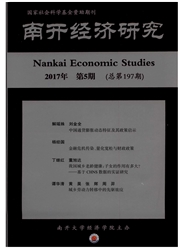

 中文摘要:
中文摘要:
本文运用中国1991-2005年的省际面板数据,研究了财政分权背景下地方政府干预和区域金融发展对经济增长方式转型产生的影响。研究发现,区域金融发展有助于促进省际TFP增长率的提高,并有效抑制了资本的“粗放式”积累,这有助于经济增长方式从“粗放型”向“集约型”转变。但在财政分权的背景下,出于自身财政压力和政治晋升压力等原因,地方政府会直接或间接干预金融机构的资金运用,这会固化中国目前依靠资本投入和积累速度提高的“粗放型”经济增长方式,因而对经济增长方式转型产生极为不利的影响。同时,金融发展和财政压力的地区差异,也会造成落后地区以更为“粗放”的方式实现增长。这会加剧落后地区金融风险的积累,不利于我国宏观经济的稳定。因此,协调中国的财政体制与金融体制改革,对促进经济增长方式转型和经济增长效率的提升极其重要。
 英文摘要:
英文摘要:
The paper empirically investigates into the impact of local government intervention on the growth performance of regional financial development using a panel data covering from 1991 to 2005.We find that,under the circumstances of fiscal decentralization,regional financial development may contribute to the increase of provincial TFP and to certain extent,reduce the extensive accumulation and growth of China's capital. This is helpful to the shift of china's economic growth mode. However,we also find that in the case of China's fiscal decentralization, local government will intervene into the financial system due to fiscal pressure ,political promotion pressure and GDP competition. This intervention may prevent China from economic growth mode shift. Furthermore,the regional differences in the financial development and fiscal pressure encourage the more underdeveloped western provinces to adopt a more extensive growth mode to catch up with the eastern and medium provinces,which in the result may accelerate the financial risk accumulation and be harmful to the stability and persistence of the economic growth in China.
 同期刊论文项目
同期刊论文项目
 同项目期刊论文
同项目期刊论文
 期刊信息
期刊信息
